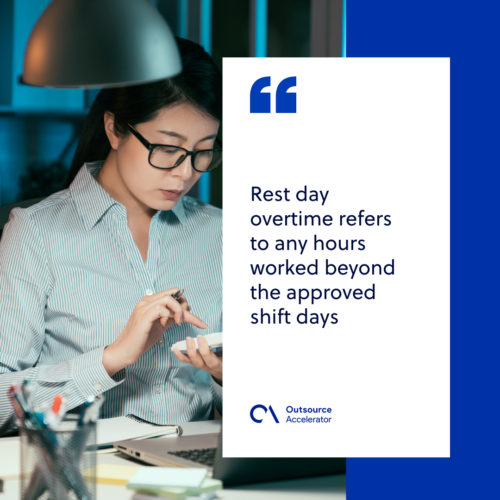Rest day overtime
Definition
What is rest day overtime?
Rest day overtime refers to any hours worked beyond the approved shift days. To break it down, a normal working day only lasts for eight hours, nine if you count the unpaid break. Beyond these hours, any work done is considered overtime.
Therefore, any work done on time off (e.g., weekend) is automatically considered rest day overtime. Approved requests for overtime are subject to payment, to be paid out on the next payout day.
All employees are entitled to at least 48 hours of rest (two days) if they render 40 hours of work in a week.
Although, in recent years, there have been talks of implementing a four-day workweek wherein workers can render 40 hours in just four days. This setup allows them to have 72 hours (three days) for resting.

Why do employees render overtime hours?
Employees often work extra hours due to heavy workloads that they’re unable to finish during their regular workday.
There are times when the workday just doesn’t seem to cut it, especially when it’s in the middle of peak season. This means working during weekends and/or holidays.
On the other hand, employers can request their workforce to come in for rest day overtime. This warrants mandatory overtime pay.
Pros and cons of rest day overtime
To both parties involved, there are pros and cons to working extra hours and on rest days. Discussing the benefits and the drawbacks of overtime would be beneficial for employers and employees alike.
Some employers highly discourage working past the prescribed time to promote efficiency and productivity in the workplace. But there are times when the workload can’t be done within the day.
Pro #1: More work gets done
Everyone that works beyond their shift wants to get more things done. Be it backlogs, their present workload, or some other things, working past their workday means checking off overdue or pressing tasks.
Pro #2: No more backlogs for next week
Speaking of backlogs, if an employee wants to render a couple of hours past their shift, one of the most common factors is finishing backlogs.
If an employee finishes all of their backlogs for the following days, then they could potentially take on new tasks.
Con #1: Burnout
One of the risks of working more is suffering from occupational burnout. While work gets done, more and more energy gets burned. Burnout affects workers, both physically and mentally, and can lead to a higher employee churn rate.
Con #2: Less personal time
Rest day overtime allows employees to work on their tasks even during their time off. To most, their time off, weekends, and holidays are a special time to rest and catch up with their loved ones and personal chores.
Companies that give the privilege of overtime pay risk having their employees favor work more than their personal lives.







 Independent
Independent




